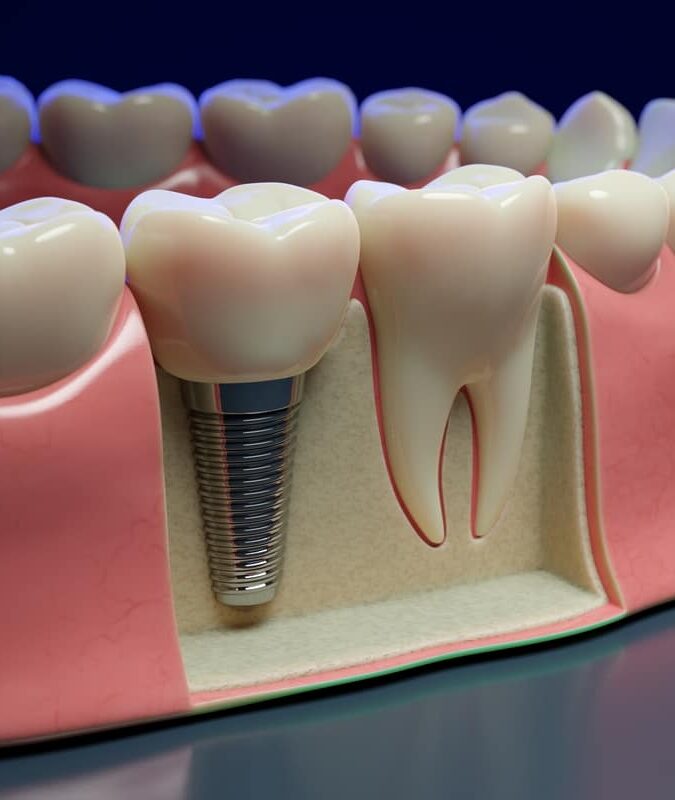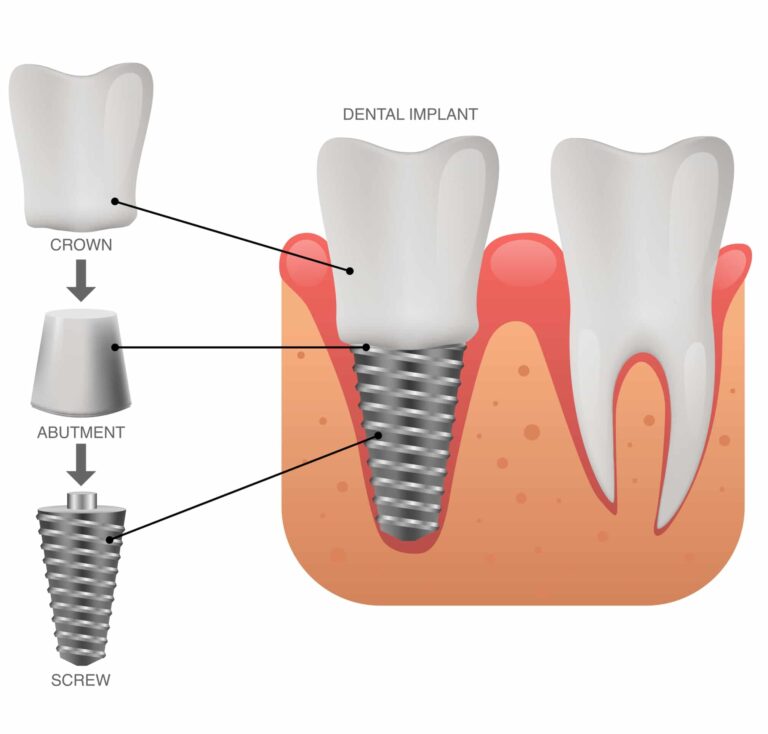Missing teeth can impact much more than your appearance. Everyday activities like enjoying your favorite meals or speaking clearly can become uncomfortable or frustrating. Over time, the gaps left behind can cause surrounding teeth to shift, throwing off your bite and alignment. Even more serious, untreated tooth loss can lead to bone loss in your jaw, weakening your bite and increasing the risk of additional dental issues. On top of the physical effects, many people also experience a loss of confidence in social and professional settings.
At Dental Depot in Midwest City, we provide advanced dental implant solutions to fully restore your smile and protect your long-term oral health. Unlike bridges or removable dentures that only replace the visible part of the tooth, dental implants restore the full tooth structure—including the root beneath the gums. This helps maintain bone strength, supports your facial structure, and delivers a strong, secure fit that feels completely natural.
With the expertise of our experienced team, advanced technology like 3D imaging and computer-guided implant placement, and flexible payment options, we make it simple to achieve a long-lasting, stable solution that allows you to eat, speak, and smile confidently once again.

At Dental Depot in Midwest City, we understand that missing teeth can impact nearly every part of your daily life. Chewing your favorite foods may become uncomfortable, speaking clearly can feel difficult, and many people feel self-conscious when interacting with others. But beyond how it affects your confidence, untreated tooth loss can cause surrounding teeth to shift and lead to bone loss in your jaw, increasing the risk of future dental problems.
That’s why finding a permanent solution like dental implants in Midwest City is so important for protecting both your smile and your long-term oral health. Unlike bridges or dentures that sit on top of your gums, dental implants replace the entire structure of your missing tooth — from the root below the surface to the crown above. This helps stimulate and preserve your jawbone, maintaining your facial structure and providing a strong, stable foundation for your replacement teeth.
With advanced tools like 3D cone beam imaging and computer-guided implant placement, our skilled team at Dental Depot Midwest City delivers highly accurate, minimally invasive dental implant procedures. The result is a replacement tooth that looks, feels, and functions like your natural teeth — allowing you to eat, speak, and smile with full confidence.
Whether you’re missing one tooth or several, our experienced implant team will develop a customized treatment plan to restore your smile and help you enjoy long-lasting results with dental implants in Midwest City.

If you’re unsure, our team at Dental Depot in Midwest City can evaluate your oral health and create a personalized plan for you.
For years, dentures and bridges have helped patients replace missing teeth, but both options come with challenges. Dentures can slip, feel uncomfortable, or require adhesives to stay secure. Bridges, while more stable, rely on neighboring teeth for support, which may put additional strain on otherwise healthy teeth. Most importantly, neither option addresses jawbone deterioration that naturally occurs when tooth roots are missing.
That’s where dental implants in Midwest City offer a major advantage. By placing the implant directly into the jawbone, we’re able to replicate the function of a natural tooth root, keeping the bone stimulated and healthy. This helps maintain jaw strength and facial structure while providing a solid foundation for your new tooth — allowing your replacement teeth to look, feel, and function like your own.
Unlike dentures or bridges, which often need to be replaced after several years, dental implants are built to last. Each implant features a small titanium post that bonds securely with your jawbone, topped by a custom-crafted crown that blends naturally with your smile. With proper care, dental implants can provide reliable, long-lasting results for decades.
At Dental Depot Midwest City, we use advanced tools such as 3D cone beam imaging and computer-guided implant placement to ensure every procedure is precise, comfortable, and designed for long-term success. From your initial consultation to the final crown placement, we make your entire dental implant experience in Midwest City smooth, efficient, and focused on helping you regain full confidence in your smile.
At Dental Depot in Midwest City, our goal is to help every patient achieve a healthy, beautiful smile they can feel proud of for years to come. Our experienced team includes dental implant specialists, prosthodontists, oral surgeons, orthodontists, and highly trained general dentists — all collaborating to deliver complete, personalized care for every stage of your treatment.
By combining this depth of expertise with cutting-edge technology like 3D cone beam imaging, computer-guided implant placement, and the most advanced dental equipment, we ensure that your dental implant treatment in Midwest City is precise, efficient, and tailored specifically to your needs. Our comprehensive approach allows us not only to restore your smile’s appearance but to protect and support your long-term oral health, giving you lasting confidence and peace of mind.
You don’t have to go on living with missing teeth. Implant dentistry makes it possible to surgically replace missing teeth with new prosthetic teeth that look, feel and perform like natural teeth.
Tooth replacement options such as fixed bridges and dentures offer only limited relief from the side effects of tooth loss. They also can have side effects of their own, such as the need to replace bridges in order to avoid bone loss, or an uncomfortable fit with dentures.
Dental implants are different. Dental implants do more than simply replace missing teeth above the gum line. They also act as an anchor below the gum line and stimulate the bone just like natural teeth would. Plus, dental implants are durable, lasting 10 to 15 years longer than other prosthetic options.
A dental implant replaces the lost roots of teeth. Overlooked by other prosthetics (which only replace the visible crowns of teeth), the roots of teeth are very important for maintaining healthy bone mass. Once a tooth is lost, bone is left unstimulated. Because dental implants are made from a strong and bio-compatible titanium, the bone surrounding the implant will generate new tissue and integrate to the implant. As the implant stabilizes, a permanent prosthetic such as a dental crown or series of dental crowns (a bridge) can be attached to an abutment that slightly protrudes through the gums.
Once the prosthetic is secured to the implant, a patient’s smile is beautifully restored with a very natural looking and functioning tooth replacement. The entire process from implant to placement of the crown typically takes six months to complete, although this can vary based on individual treatment needs.
Dental implants offer unique advantages when compared to other tooth replacement options. First, stabilized implants are very durable and long lasting. Unlike dentures, a dental implant can hold prosthetics firmly for decades, if not the rest of a person’s life. This durability is important for restoring oral function, too, because implants allow patients to eat a full diet of even difficult to chew foods. Dentures tend to become ill fitting over time, while dental implants won’t.
Dental implants also are low maintenance. Unlike dentures, which require removal for cleaning, or bridges that might need water irrigation underneath their crowns, dental implants are cleaned by brushing and flossing, just like your natural teeth.
If you have suffered tooth loss and want to explore your replacement options, schedule your consultation today! During your consultation, our team will answer your questions, provide information about the procedure and perform an exam to determine if you are a good candidate for dental implants.
If for some reason you are not a candidate for dental implants, our team will suggest other tooth replacement options that might be better suited to your particular needs. Our team believes that no one should have to suffer the health or quality of life effects of an incomplete smile.
Dental implants are one of the most durable tooth replacement options, primarily because they are anchored below the gumline and fuse with the bone in the jaw. They tend to last 10 to 15 years longer than alternative options and rarely, if ever, require replacement.
An implant refers to a tiny titanium screw that is placed in the jaw below the gumline; it acts as an artificial tooth root. The implant is then covered by an abutment and a crown, with the crown serving as the artificial tooth.
While a dental implant cannot get a cavity or tooth decay, you should still care for them as you would your natural teeth and for several reasons. First, you are still susceptible to gingivitis, gum disease, and infection, even with implants, and secondly, you still need to protect any remaining natural teeth you may have.
Even with dental implants, good dental hygiene practices are essential for long term oral health and overall well being. Daily brushing and flossing are essential to caring for both your implants and your natural teeth, as are bi-annual visits to the dentist, which can also serve as an opportunity to detect early signs of peri-implantitis, a form of gum disease specific to the bone and tissue around dental implants.
Bone grafting, a surgical procedure in which healthy bone is transplanted to rebuild or repair damaged or diseased bone, is not always necessary for patients undergoing dental implant surgery, but it is fairly common. Bone grafting is most often necessary when a patient doesn’t have enough natural bone in their jaw to support dental implants. It can take anywhere from four to six months to even eight months to a year for bone grafts to heal.
If you require bone grafting before dental implant surgery, your specialist will walk you through the various types of grafts and make a recommendation on which graft is most appropriate for you, then schedule your implant surgery based on the timeline for your bone graft procedure and healing. Once the bone graft has healed, you can proceed with your dental implant surgery procedure.
Dental implants have a nearly 98% success rate for most patients and with proper care, can last a lifetime without needing replacement.
Dental Depot Oklahoma is one of only a few offices that uses CBCT technology to increase positive outcomes for dental implant surgery. CBCT technology allows the dentist to take a 3D image of your mouth, which offers important information about the implant site or sites, including precise bone measurements, insights on the quality of the bone, placement of blood vessels and nerves, and the existence of any abnormalities which might impact the procedure. By gathering all of this specific data before even starting the procedure, our dental implant surgeries are even more reliable and accurate.